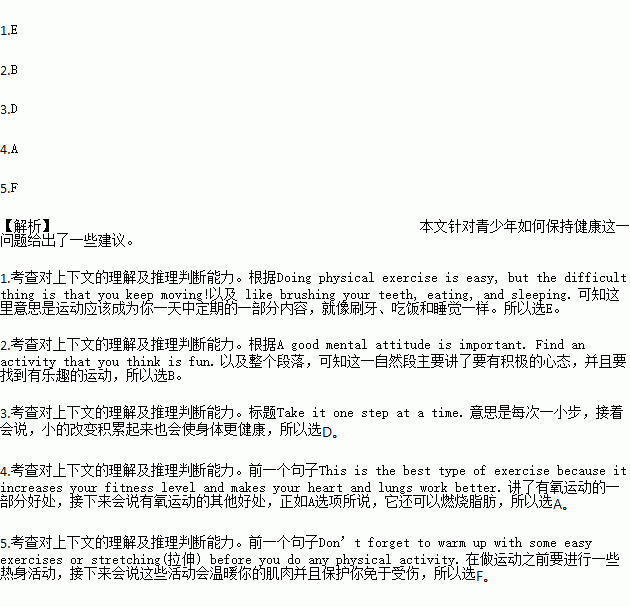题目内容
How Teens Can Stay Fit
Any type of regular, physical activity can improve your fitness and your health. Doing physical exercise is easy, but the difficult thing is that you keep moving!1., like brushing your teeth, eating, and sleeping. It can be in gym class, joining a sports team, or working out on your own. Keep the following tips in mind:
2.. A good mental attitude is important. Find an activity that you think is fun. You are more likely to keep with it if you choose something you like. A lot of people find it’s more fun to exercise with someone else, so see if you can find a friend or family member to be active with you.
Take it one step at a time.3.. For example, walk or ride your bike to school or to a friend’s house instead of getting a ride. Get on or off the bus several blocks away and walk the rest of the way. Use the stairs instead of taking the elevator or escalator.
Get your heart pumping(跳动). Whatever you choose, make sure it includes aerobic(有氧的) activity that makes you breathe harder and increases your heart rate. This is the best type of exercise because it increases your fitness level and makes your heart and lungs work better.4.. Examples of aerobic activities are basketball, running, or swimming.
Don’t forget to warm up with some easy exercises or stretching(拉伸) before you do any physical activity.5.. Stretching makes your muscles and joints more flexible too. It is also important to stretch out after you exercise to cool down your muscles.
A. It also burns off body fat
B. Stay positive and have fun
C. Physical exercise can help prevent diseases
D. Small changes can add up to better fitness
E. Exercise should be a regular part of your day
F. This warms your muscles up and may help protect against injury
G. Do the activity as often as possible, but don’t exercise to the point of pain.

